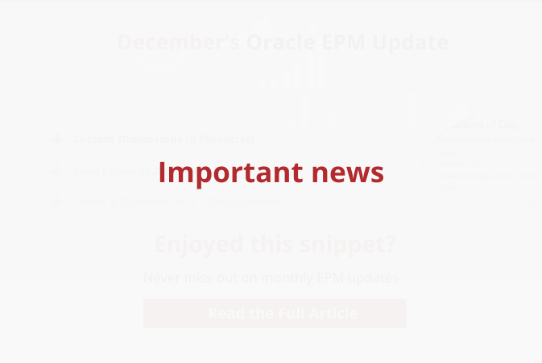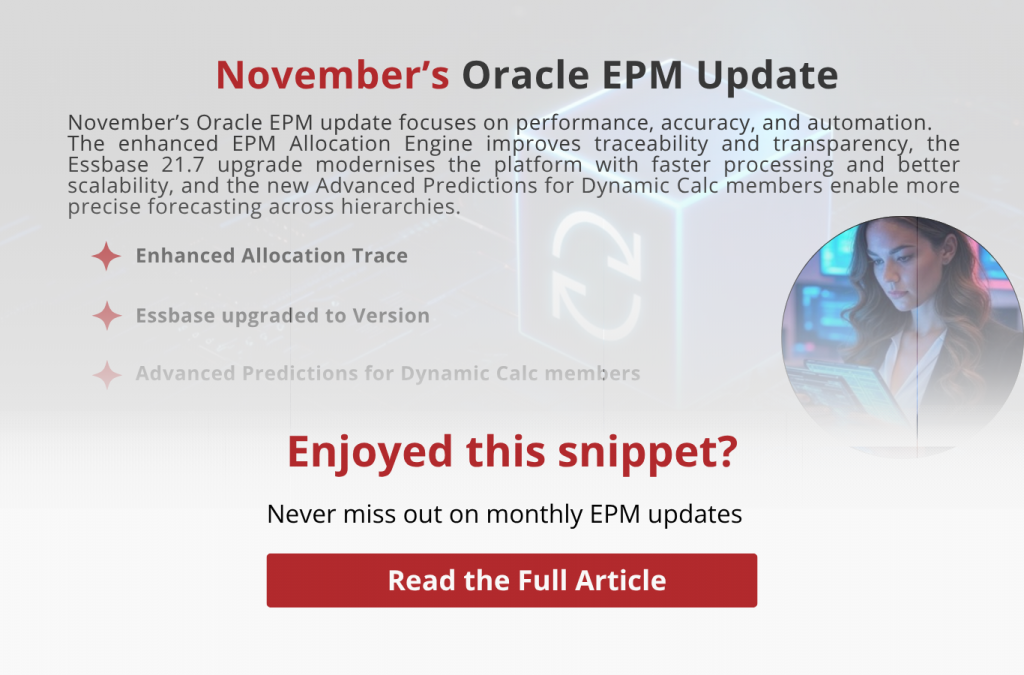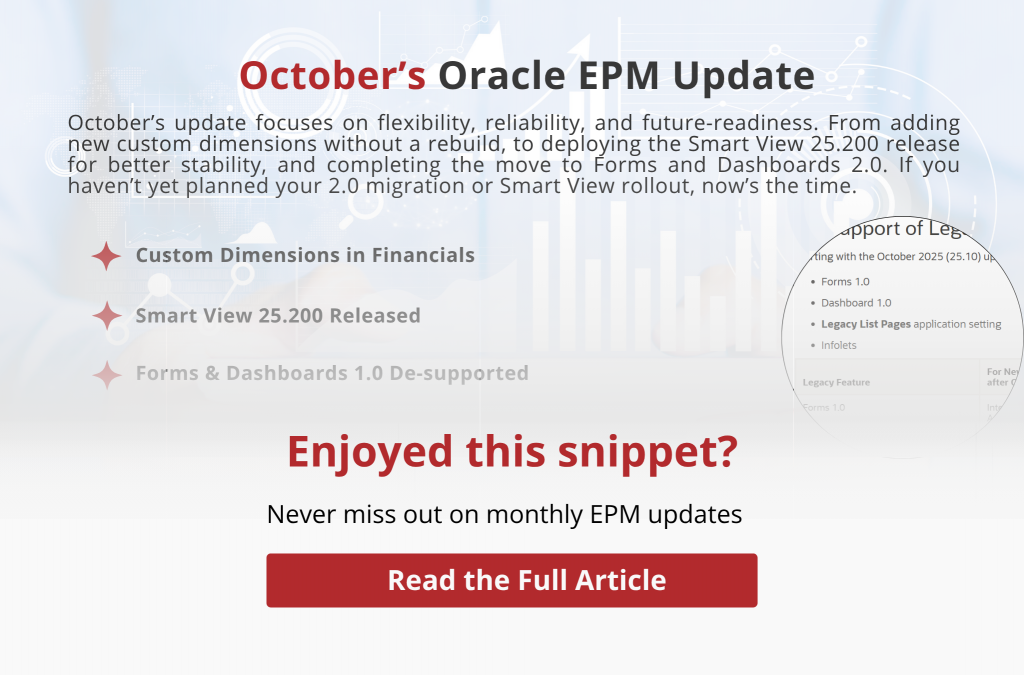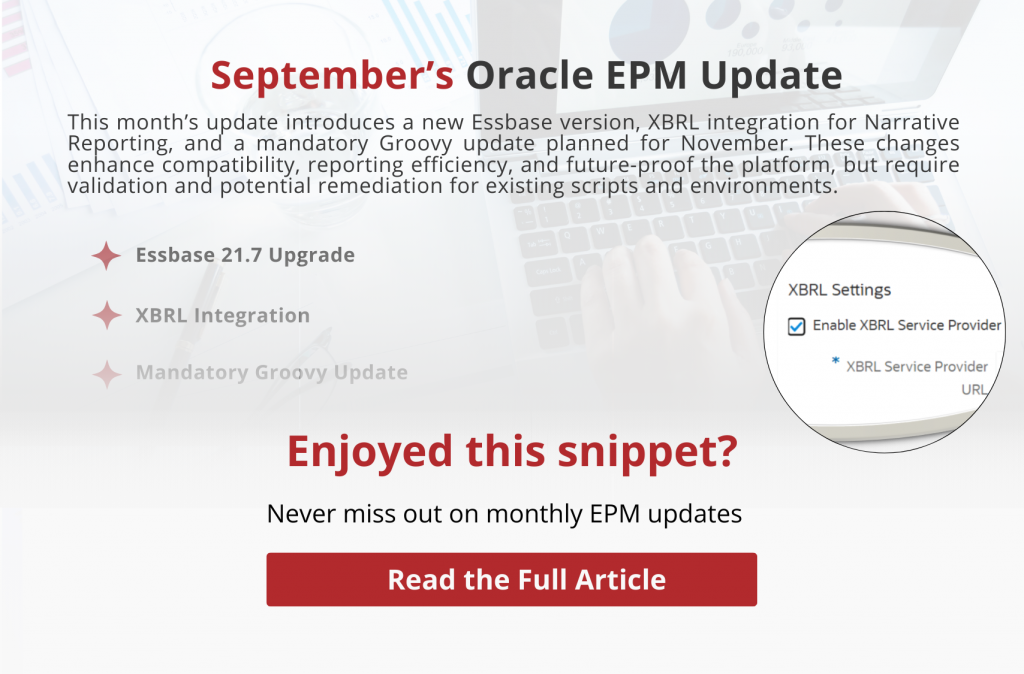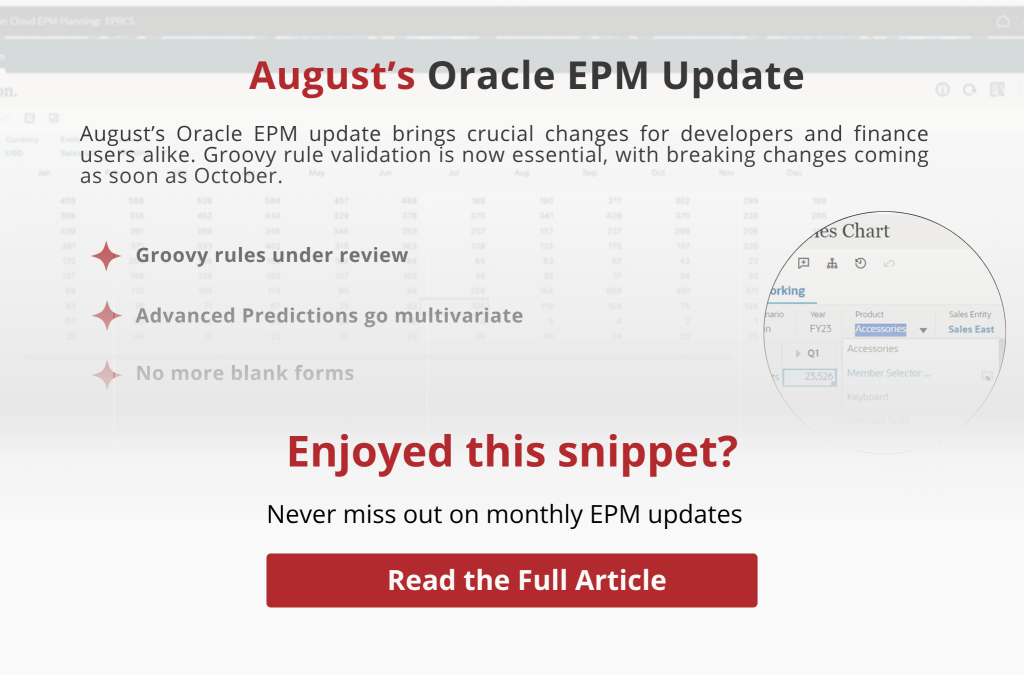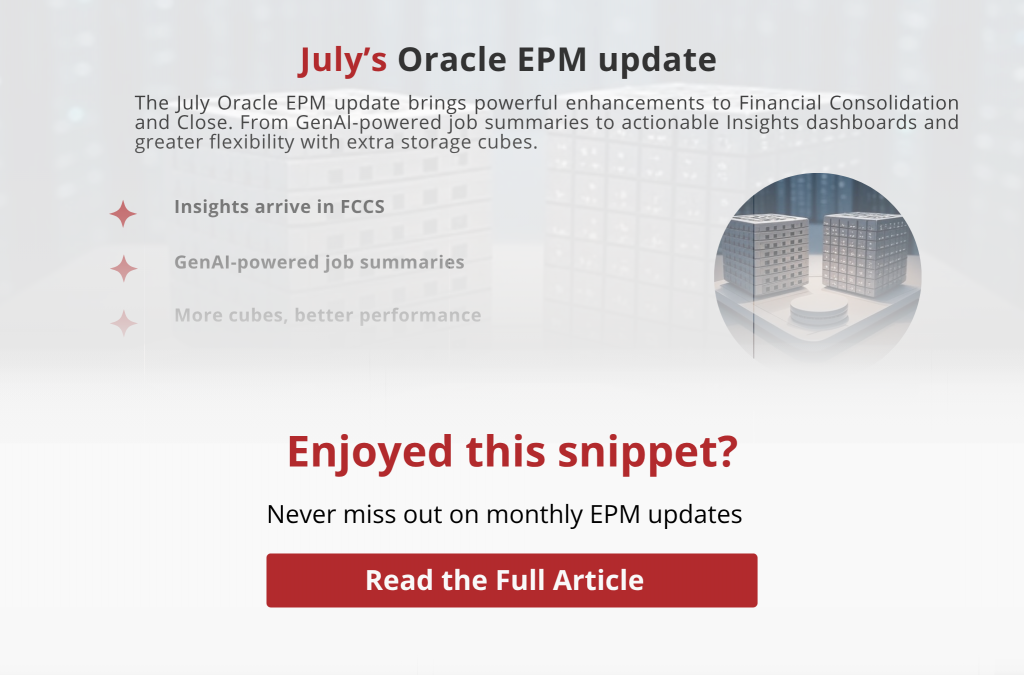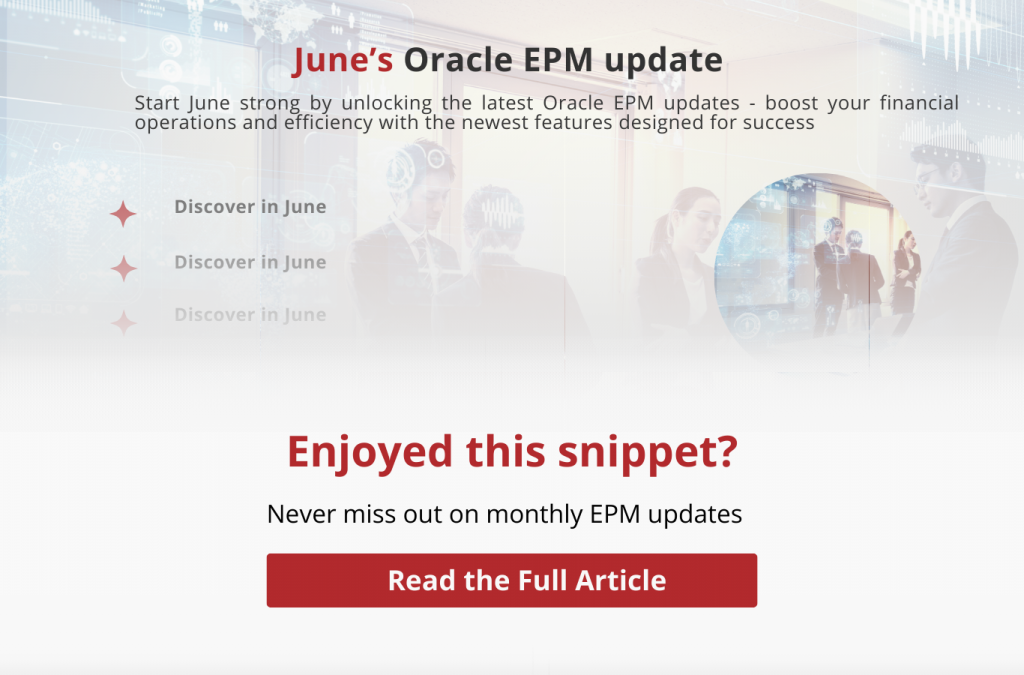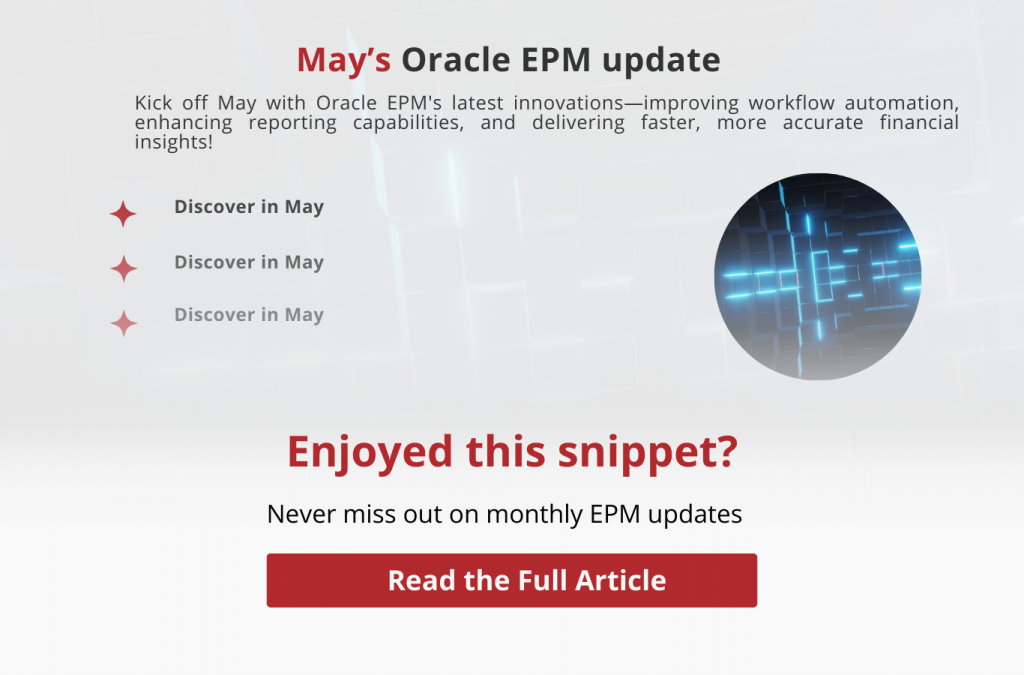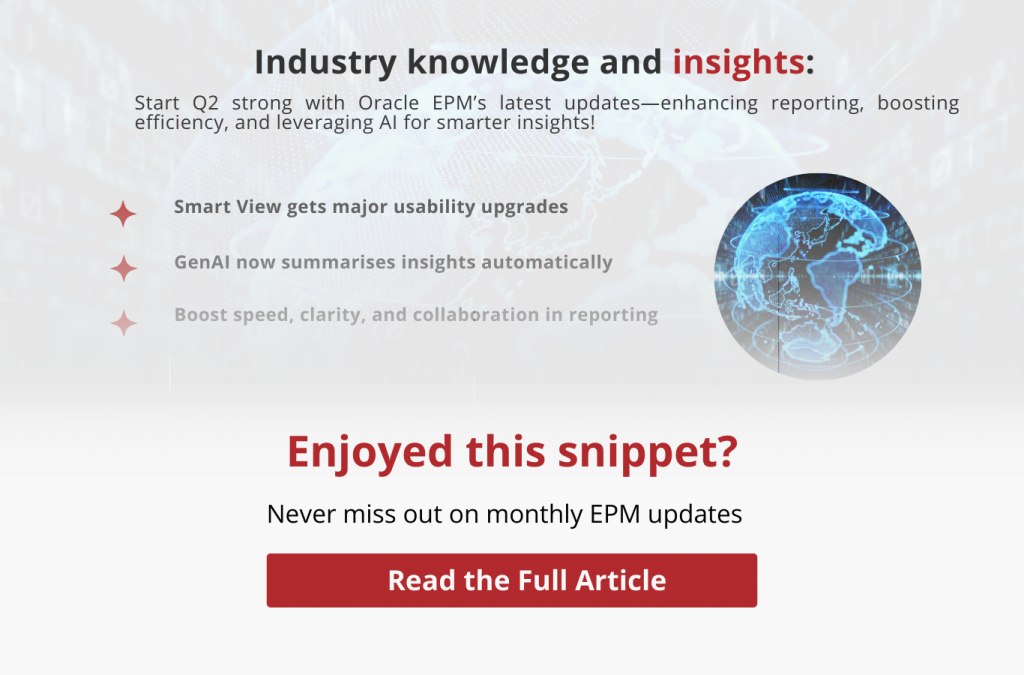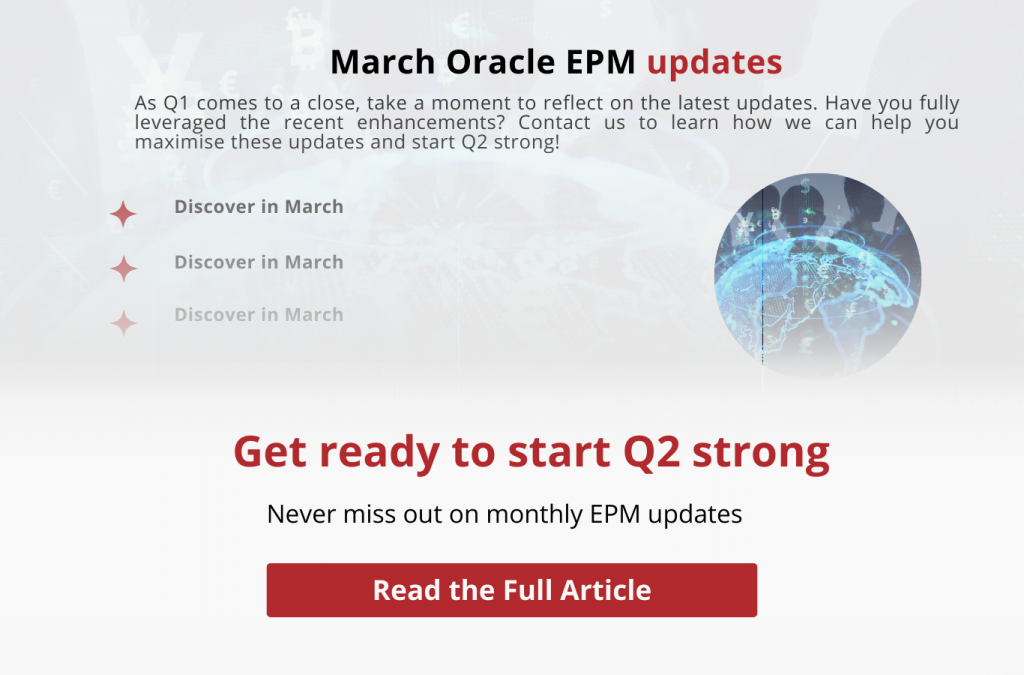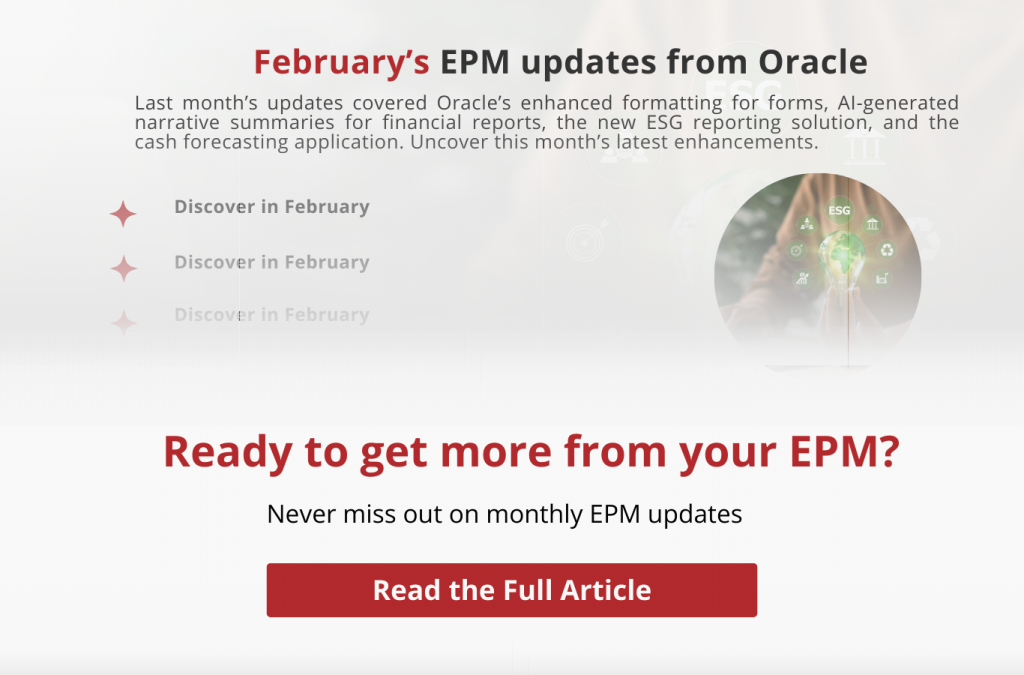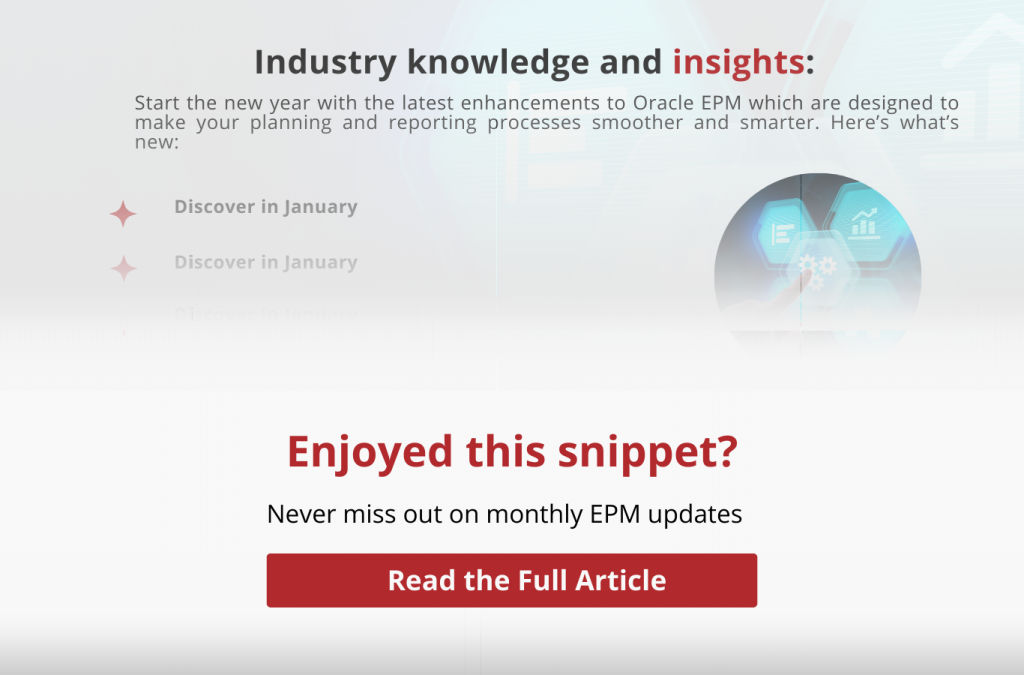Monthly EPM updates
Each month, Oracle releases detailed EPM updates packed with essential insights. To help you stay ahead, we carefully curate and summarize the most impactful updates, making it easy for you to stay informed and maximize your EPM investment. Stay tuned for our monthly highlights.
The latest EPM updates
2024 Oracle EPM updates
December
Smart View Comments
Smart view will now detect comments (text typed outside the grid) and unknown members (text typed inside a grid) on a grid and retain them after refresh.
To use this feature, you enable the new option ‘Keep Invalid Members/Comments”.
This feature allows you to set a cell style for ‘Comments’ that will be easily recognised – see figure below highlighting unknown members:
- Febb (Member should be Feb)
- 7420: Rent Expenses (Alias should be 7420: Rent Expense)

Cloud EPM System Reports
You can now generate Cloud EPM System Reports within Reports, specifically for the Cloud EPM business processes and components, such as Task Manager, Supplemental Data, and Enterprise Journals.
Reports, Oracle EPM’s report writing tool, now provide an improved user interface for designing system reports and additional features that are currently not available with the Oracle Business Intelligence Publisher (BI Publisher) – based solution. In addition, system tables can be displayed in the same report with grids.
Digital Assistant
The EPM Digital Assistant now includes voice recognition service, enabling you to converse using voice messages by converting the voice input to a text message.
Therefore, this update now enables you to interact with the Digital Assistant by speaking.
November
This month’s update is built to make your work smoother and more impactful through:
1️⃣ Design Time Formatting in Forms 2.0
Now you can format forms directly in the web interface for display on both the web and Smart View.
- Formatting Rules: For dimension member names, descriptions, and data values.
- Capabilities: Customise borders, colours, font sizes, fonts, and numeric formats.
- Benefits: Defined format rules apply across users, creating a consistent and familiar experience that mirrors spreadsheet formatting.
2️⃣ New Sustainability Solution for ESG Reporting and Planning
Oracle introduces a new solution for end-to-end ESG reporting and planning, aligned with global frameworks like CSRD, GRI, SSAB, and TCFD.
- Built as a custom planning app within Cloud EPM Enterprise Planning.
- Provides a single source of truth for collecting, modelling, and reporting ESG data.
- Accelerates sustainability agenda planning and compliance.
3️⃣ Enhanced Pillar Two Classification in Tax Reporting
Tax Reporting now supports classifying entities into 20 OECD-compliant categories, such as:
- Constituent Entity
- Hybrid Entity
- Permanent Establishment
- Low-Taxed Constituent Entity
This enhancement ensures compliance with OECD Global Minimum Tax rules and impacts minimum tax calculations.
For more details or assistance with implementation, reach out to us!
October
Oracle EPM Updates – October 2024 Overview
This month, we’re bringing you a series of significant enhancements across various Oracle EPM modules, from Smart View to Financial Consolidation and Close, Narrative Reporting, and Tax Reporting. These updates are designed to improve usability, streamline processes, and provide cutting-edge tools to help your finance teams work smarter.
Below is a comprehensive breakdown of the key updates.
Smart View – Version 24.200
The latest version of Smart View (24.200) introduces a variety of new features and fixes that significantly enhance Excel-based EPM management. This is the second major update for 2024, and we highly recommend it for any teams using Smart View for EPM tasks.
Key Enhancements:
- Updated Admin Extension: Simplifies the maintenance of EPM master data within Excel, giving administrators greater control.
- New Trace Traffic Tool: A valuable debugging tool that provides real-time insight into system traffic, allowing users to identify and fix issues faster.
- Retain Numeric Comments: When refreshing a worksheet, numeric comments are now retained, ensuring continuity in your data.
- Ad Hoc Grid Refresh: The ability to refresh data in ad hoc grids for saved worksheets, streamlining the workflow.
- Improvements and Defect Fixes: A series of bug fixes and optimisations that improve overall stability and performance.
Financial Consolidation and Close (FCC) – Ownership Management Updates
This major update focuses on improving Ownership Management in FCC, making it easier to manage complex ownership structures, particularly for shared entities. The new features aim to enhance flexibility, control, and transparency within the consolidation process.
Key Updates:
- Enhanced Organisation by Period: This update introduces a more structured approach to managing ownership data, allowing for better handling of shared entities.
- Inactive Consolidation Method Behaviour: Provides more nuanced control over how inactive entities are handled within consolidations.
- Translation into Parent Currency: Automatically translates shared instances of the Entity Total Member into the Parent Currency, simplifying multi-entity consolidation processes.
- Approval Unit Changes: Each instance of a shared entity now has its own Approval Unit, allowing for more granular control over the approval workflow.
- Independent Locking: You can now lock and unlock shared entities on the Ownership screen independently of the Approval Unit, providing greater flexibility in managing entities.
- Prior Period Data Updates: A new configuration task ensures consistency in Parent Currency/Entity Total data when new shared entities are added.
Narrative Reporting
Generative AI for Management Reporting
The most exciting development in Narrative Reporting is the introduction of Generative AI. This innovative tool automates narrative creation, providing powerful AI-driven insights that save time and enhance the quality of management reports.
Key Features:
- AI-Generated Narratives: Automatically generate management reporting narratives based on your financial data, reducing the manual effort required to explain key figures.
- Exception Descriptions: AI identifies and describes any data exceptions, helping finance teams address potential issues faster.
- Causality Analysis: The AI provides insights into the cause of exceptions, giving users a deeper understanding of variances or anomalies.
- Comparative Analysis: Perform quick, AI-driven comparisons of different datasets, enabling faster and more informed decision-making.
Tax Reporting – Pillar Two Automation
The latest updates in Tax Reporting focus on automating Pillar Two compliance, providing better control and accuracy in managing global tax regulations. This new automation helps finance teams ensure compliance while minimising the risk of errors.
Key Features:
- Enhanced Tax Automation: The new configuration provides best practices for setting up tax automation processes, ensuring compliance and accuracy.
- Pillar Two Automation: A specific focus on Pillar Two regulations, helping businesses align their tax reporting with global standards while maintaining control over automated processes.
Platform Updates – New Tools for Enhanced Efficiency
In addition to module-specific updates, the Oracle EPM platform itself has seen several key improvements designed to make your overall experience smoother and more efficient. These updates improve both functionality and user experience across the board.
Key Updates:
- REST API Enhancements: The new API functionality allows users to export batches of documents instead of one at a time, improving efficiency and scalability in reporting processes.
- Voice Recognition Service: Oracle EPM’s Digital Assistant now includes Voice Recognition, enabling users to execute commands and queries with voice inputs, simplifying navigation and increasing efficiency.
- New Audit Types: Enhanced audit tracking now allows users to monitor all Create, Modify, and Delete events within reports. This improves transparency and ensures full compliance with internal and external auditing requirements.
🔗 Contact Us Today to learn how we can help: GK | Oracle EPM Specialists (office365.com)
September
GK’s Top 3 Highlights for this month’s EPM updated
New REST API for Exporting Audit Reports:
Oracle now offers a REST API to export audit reports, an essential feature since audit data is only stored for 90 days in the system. While this capability also exists in EPM Automate, we encourage our clients to adopt REST APIs for better scalability and efficiency in managing audits.Job Scheduling in Data Management and Data Integration:
Oracle has added job scheduling functionality directly within EPM’s job scheduler, allowing users to schedule data jobs. At GK, we recommend using the new pipeline feature to automate these processes, which can now also be scheduled in the job scheduler for a smoother workflow.Updated EPM Books Extension for Smart View:
A new extension allows users to download books created with Oracle EPM’s report tool directly into Smart View. This integration simplifies access to critical financial reports, enabling smoother data retrieval and analysis.
Other notable updates:
- FreeForm Planning Enhancements:
Oracle’s FreeForm Planning now allows for the creation of completely custom planning models, with support for advanced intelligence features like IPM Insights, Auto Predict, and Predictive Planning. This provides users with a more flexible and intelligent financial planning experience.
These changes may seem incremental, but they provide real value in improving the performance, automation, and intelligence of the Oracle EPM platform. We recommend discussing these updates with your clients to showcase Oracle’s continued commitment to innovation.
August
This month’s update has no major features but a few interesting gems for various stakeholders.
For Users:
Oracle Guided Learning console – EPM users now have access to the Oracle Guided Learning console meaning users are now enabled to create and activate guides within EPM Cloud applications. Oracle Guided Leaning is a robust framework for developing personalised, guided, and contextual training and user onboarding experiences.
For IT:
Air-Gapped Backups – Oracle now ensures that the daily EPM backups are air-gapped and replicated in secondary regions. The air-gapped backup ensures the survivability of data in case of a region outage, ensuring advanced data protection, and that backups are not lost in the event of a disaster.
For Admins:
Rest APIs for User Variables and to copy to and from a SFTP server – User variable APIs allow administrators to provide default values for user variables when creating new users as well as query the user variable values for different selection criteria. SFTP APIs allow you directly copy files between EPM Cloud and a secure FTP server without intermediary steps.
For Profitability and Cost Management:
IPM Insights and Task Manager – these additions bring this PCM application in line with the rest of the EPM applications on the EPM platform.
July
In this release Oracle is concentrating on streamlining their customer base by automatically updating customer environments that have not upgraded to the latest features. It is therefore another small update with no ‘Larger Scale’ UI or Process based features.
GK’s Top 3 Highlights For The EPM Platform
– Migration of UK Government environments to OCI infrastructure:
standardising on the new OCI architecture allows Oracle to deliver greater performance and reliability.
– Removal of non-Redwood themes:
Redwood themes allow for dynamic tabs and the latest clean UI.
– Upgrading all EPM environments to a hybrid Essbase version:
This change affects the Essbase version used in EPM Cloud; it does not affect the cube configuration in your application, though we recommend upgrading the cube configurations to take advantage of hybrid’s better performance.
A standardised estate makes sense as it is easier for Oracle to support.
Other small platform changes worth calling out are:
- Auditing – ability to track events related to when the application was enabled for all users or only for Service Administrators.
- Job Scheduling – EPM Platform Job Scheduler console now supports the execution and scheduling of Data Management/Data Integration jobs.
And one small Planning change to call out:
- ESG Planning Application – EPM for Sustainability application has been updated to support the GHG Protocol Scope 3.6
June
This month’s update is a small-scale update focused on providing a lot of small changes for the EPM process – Enterprise Data Management.
GK’s Top 3 Highlights For The EPM Platform
Extended Backup Coverage:
Data security takes centre stage as Oracle extends the coverage of daily backups to 60 days. Now test environments also benefit from this critical feature, ensuring data integrity and resilience. With seamless retrieval options via Oracle’s API or EPM Automate, peace of mind is just a click away.
Forms 2.0 Default Adoption:
Oracle’s confidence in Forms 2.0 shines through as it becomes the default version recommended for users. This transition signifies the resolution of reported bugs and enhancements in user experience, setting the stage for smoother EPM operations.
Burst Zipped Consolidated Attachments:
A new feature allows users when bursting reports to zip, and consolidate attachments for easier management and distribution. This enhancement streamlines the reporting process, making it more efficient and user-friendly.
GK’s Top 3 Highlights For The Processes
EDM – Empowering Data Management:
A slew of small yet impactful features enrich the Enterprise Data Management (EDM) process. Users are encouraged to explore these updates, ensuring optimal data governance and efficiency.
FCC – Flexibility Redefined:
Financial Consolidation and Close (FCC) processes have been refined to offer greater flexibility and control. This update includes enhancements that streamline the consolidation process, making it more adaptable to various organisational needs.
Narrative Reporting – Streamlined Processes:
Narrative Reporting now features streamlined processes for creating and managing reports. These enhancements ensure that users can produce comprehensive, accurate reports with greater ease and efficiency.
GK’s 3 Upcoming Features Highlighted With This Release:
Redwood Theme:
In July, all customers will automatically upgrade to the Redwood theme, which includes dynamic tabs. This upgrade promises a more modern and efficient user interface, enhancing overall user experience.
Hybrid Essbase:
All Oracle EPM applications will be upgraded from non-Hybrid BSO to Hybrid BSO. Note that while the applications will be upgraded, individual cubes will require action to update. The rollout schedule includes 24.05 for Profitability and Cost Management, 24.06 for Narrative Reporting, and 24.07 for Planning, subject to notification in mid-June.
FCC Substitution Variables:
It is recommended to set substitution variables to ‘True’ to realise performance benefits. These will be set to ‘True’ by default in upcoming releases, ensuring improved efficiency and speed in FCC processes.
These updates aim to provide a more efficient, secure, and user-friendly EPM environment.

